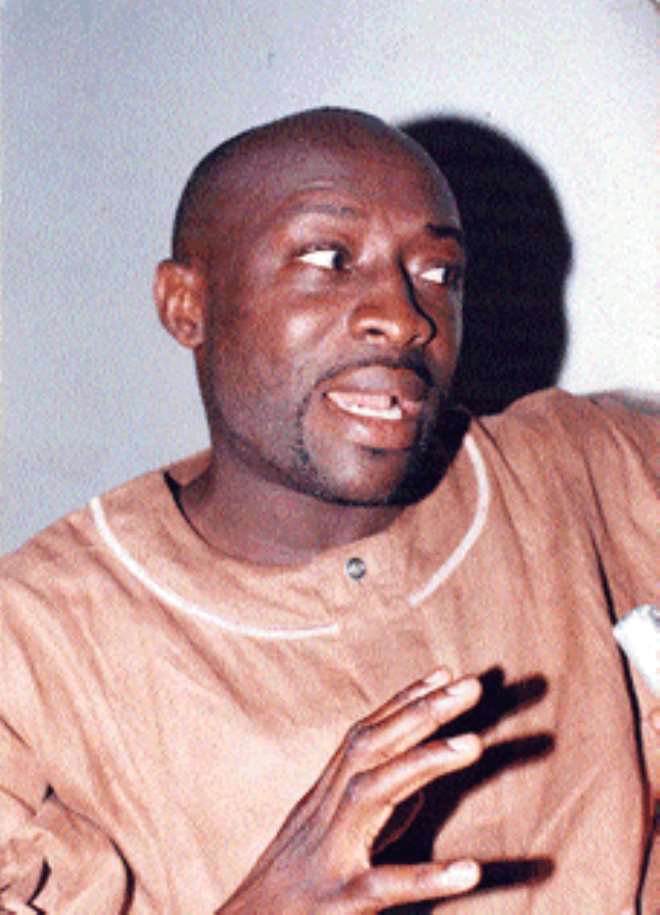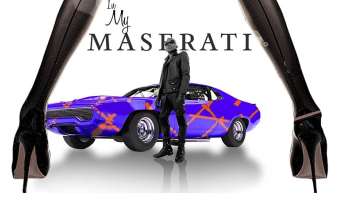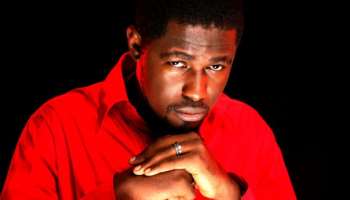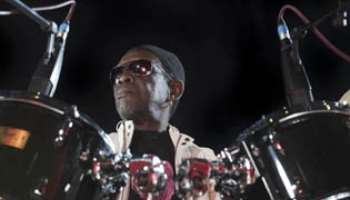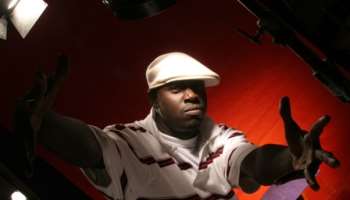DAY I COLLAPSED AT AFRIKA SHRINE-ADEWALW AYUBA
Celebrated singer, Adewale Ayuba, would scarcely strike you as the quitessential Fuji crooner. Indeed, you will be pardoned if you mistaken the multiple award-winning star for a youthful corporate executive.
Devoid of sleaze, street slang and arrogant swagger often flaunted by many practitioners of his chosen genre, Ayuba carries himself with an urbane air, charming youth with a personality that exudes confidence, poise and panache. As Daily Sun had a chat with him on that Wednesday morning, one cannot but wonder how the Ikenne-born artiste, acclaimed by all as the corporate face of fuji music, has been able to veer from the mainstream, creating a brand acceptable to both the elite and the lowly far beyond Nigeria's shores.
Honestly, I can explain it. I would just say that my orientation is a little different. These things have a lot to do with one's background, you know.
Ayuba, who clinched two trophies during the KORA awards in South Africa last December, breezed into New York in June this year.
And since his arrival in the United States, he has been traversing many American cities to celebrate the awards with his numerous fans. That, however is not the only reason for this trip. He said he was in the US to promote a personal project, but that he was keeping the project away from the public for now. I did the same thing in Germany in 2003. “When it materializes, you will definitely know”, said Ayuba who insisted that the project which had taken him to a number of schools and colleges as well as many radio and television stations across the United States was made possible by his KORA awards. Actually the awards were made possible by the song, Fuji Satisfaction, a duet with Germany-based Nigerian artiste, Ade Bantu.
This American trip, Ayuba explained was also a continuation of his self-imposed mission to internationalize Fuji music and bring it at par with other notable forms of music enjoyed worldwide.
My dream is to achieve with Fuji music what Bob Marley was able to achieve with Reggae. Bob Marley took Reggae from the streets of Kingston in Jamaica and turned it into a global form of music recognized and enjoyed by everyone all over the world. I will become a fulfilled person the day Fuji music attains such a height."
And Ayuba is, in truth, not without some measure of success in his pursuit of a global niche for Fuji music. At the 50th anniversary of the United Nations in New York a decade ago, Ayuba had thrilled the audience, dishing sweet songs to an array of notable world figures that included Dr Nelson Mandela and outgoing UN Secretary-General, Kofi Annan. He was also the first Fuji artiste ever to win a KORA.
Did he expect the award? No, he replies. In fact, when we received the nomination, I thought that was the best we could get, a nomination. I never expected to win. The song that won the award was done with Ade Bantu, a Nigerian artiste in Germany. When the nomination came, I felt that was enough for me. So, I took it to several media houses in Nigeria because winning the nomination was a great achievement for me. It had never happened before that a Fuji artiste was nominated for such an international award.
When we got to South Africa, I was surprised when they announced my name as a winner. I was excited. I can't even explain the feeling. I was so excited that I quickly went to a bathroom and called my wife, telling her that I had won. I called my mum, called some of my fans and friends. Unknown to me, while I was in the bathroom making calls, my name had been announced as a winner of another award and everybody was looking for me. So, when I came out of the bathroom, I didn't even know what was going on. I was walking to my seat when Kenny Ogungbe of Kennis Music saw me and said, Wale, where have you been? We've been looking for you. You've won another award. I was dumbfounded. It was an emotional thing for me.
And has anything changed since he took the prize? Of course, a lot of things have changed. You can't even imagine how much things have changed. That award has opened doors for me.
However, many years ago, when Ayuba indicated his desire to pursue a career as a Fuji artiste, his parents had been momentarily discomfited by the idea of their son becoming a musician. It wasn't that they didn't want me to pursue my dreams. The problem was that musicians of those days were seen as never-do wells in the society. And as soon as I assured them that music was not going to pose a threat to my education, they embraced the idea, offered their blessings and gave me 100 per cent support.
But did he fulfill that sacred promise to his parents?
Oh yes. As a matter of fact, I'm still studying. Naturally, I love to read. Already, I have a Diploma from the Ogun State Polytechnic, an Advanced Diploma from the University of Lagos and an associate degree from the Queens Borough Community College in New York . And I'm not done yet. My goal actually is to obtain a Ph.D in any discipline. Maybe by then I will be satisfied.
And why Fuji? The singer said, I took to Fuji because it was the most cost effective form of music. It was the least expensive. Highlife, Juju and other ones would have required sophisticated and expensive instruments such as guitar, piano and drums. And again, I would need to be knowledgeable in a couple of those instruments. But with Fuji, all I needed was one or two local drums.
Success, however, tarried in coming. For a guy who started singing at the tender age of seven, it took a while for this unassuming star to distinguish himself from the Fuji crowd. After five albums, Ayuba still remained just another mere name on the musical landscape, dwarfed by the larger image of already established stars like Sikiru Ayinde Barrister, Kollington Ayinla and Wasiu Ayinde. Like those other Fuji singers, he sang purely in Yoruba with a smattering of Arabic.
Then in 1989, almost frustrated by his seeming stagnancy, Ayuba went back to the drawing board and decided to inject a little pep into his act.
I thought of how to distinguish myself. I did some research and discovered that Fuji music appealed to a certain kind of people. I started thinking of how I could attract other people like business executives, students and people in the corporate world to Fuji music in a way that traditional Fuji lovers wouldn't feel alienated. The first thing I did was to start injecting English into Fuji. I then created my own unique beat and dancing style, making the tempo a little faster than before. My outlook also changed. I told my mum my plans and she encouraged me.
That experimentation paid off. Bubble, the album released by Ayuba in 1990 became a monumental hit that immediately catapulted him into national prominence. And since then, there has been no drab moment for Ayuba and his exciting career. You know a lot of people now think I started my career with Bubble. Now, I have to remind people that there were five albums before Bubble. They hardly remember that. After Bubble, I started getting invitations for concerts on university campuses.
With the new Ayuba also came a nickname, Mr Johnson. And he tells you that the story behind the sobriquet is very real. In 1989, I travelled to Rio de Janeiro in Brazil . While I was participating in a musical concert at the beach, I met a very pretty Brazilian girl. We got talking and I lied to her that my name was Mr Johnson, a university student from New York. Of course, I couldn't tell her that my name was Adewale because she might not even be able to pronounce the name. I couldn't also tell her that I am a musician because she might not like musicians. So, I lied. One day she came visiting and unfortunately for me, an old video of my band's live performance was on. She was angry that I had told her lies, and that led to the end of the brief relationship. When I returned to Nigeria, I wrote a song around that event. That was how Mr Johnson was born.
Fuji is said to have originated from Mushin , a sprawling slum in Lagos. That might explain why many still regard the genre as music reserved only for the hoi-polloi. In truth, at paraga joints, inside molue and danfo buses as well as in every motor park in Lagos and other cities and towns in Nigeria's South-West, your ears are relentlessly traumatized by an endless drone of Fuji din emanating from everywhere.
But for Ayuba, the situation is remarkably different. His concerts are largely peaceful, shunned by such violence-prone miscreants. In this life, orientation matters a lot. Your background and your image also matter a lot. So, when people say my concerts are always peaceful, they should consider my background. If you consider my lyrics, my music can't really appeal to such people. My songs are evenly spread between English and Yoruba. I don't sing saje. My songs have intense meaning and its for both adults and children.
Ayuba, however, says that his seeming non-conformist stance with Fuji has dug a gulf between him and other Fuji stars, he says. No artiste sees me as a snub. There is no animosity. They respect me and I respect them. The respect is mutual and the relationship is cordial.
As an artiste, you would expect him to be a perpetual face at night clubs, bars and other fun spots. But you are shocked to learn that all through his life, Ayuba said he has never patronized any club. Well, almost never. I've visited a club only once in my life. That was at Fela's Shrine in Ikeja. In fact, that day, I collapsed when the smoke filtered into my eyes. I can still remember Fela telling his people to take care of that Ajebota musician! That was the only time I ever went to a night club.
Watching Ayuba's shows and video, you cannot but marvel at his incredible dance skills and unusual vivacity as he prances about on stage. Since most artistes are religiously devoted to the trinity of wine, weed and women, you wonder if Ayuba doesn't sometimes take a little shot before mounting the stage.
I do not need to do that. Those who know me closely know that I am very restless. In fact, I am hyper. I can hardly stay in one place.
As for whether I rely on anything, sure you know I don't drink and I don't smoke. I cannot even stand tobacco smoke or stay near where people are smoking not to talk of smoking myself. In fact, that is why I don't go to clubs. And again, I work very hard. We rehearse very rigorously four days in a week. And by the time I find myself on stage with my band boys, I usually turn to something else. It is within me. This is not something that can be enhanced by the consumption of drinks or by drug.
As per female fans, he said: "The truth is, as an artiste, you cannot run away from women, In fact, my prayer has always been that most of my fans will be women, because if you are accepted by the women, then you can be rest assured that you've been accepted by the men too. We all know the power of women. But I know where to draw the line.
You know it takes two to tango. I am disciplined and that is why I'm free from scandals. I have one wife and a lovely family. So, I manage my female fans very well. Stardom is of God and so one should use it wisely.
Latest News
-
 "If You're For Me, I Am For You" - Cubana Chief P
"If You're For Me, I Am For You" - Cubana Chief P -
 "3 Days To Go" - Femi Adebayo Urges Fans To Get S
"3 Days To Go" - Femi Adebayo Urges Fans To Get S -
 "Stop Asking Me Questions About Speed Darlington"
"Stop Asking Me Questions About Speed Darlington" -
 "Benue Is The Most Underdeveloped State I've Ever
"Benue Is The Most Underdeveloped State I've Ever -
 Stan Alieke Urges Young Professionals To Take Lin
Stan Alieke Urges Young Professionals To Take Lin -
 Chizzy Alichi Teases Fans With Baby Reveal, Promot
Chizzy Alichi Teases Fans With Baby Reveal, Promot -
 "I'm Not Wearing Makeup From July 4th Till Decemb
"I'm Not Wearing Makeup From July 4th Till Decemb -
 "Stop The Challenge Of Mocking Kids With Down Syn
"Stop The Challenge Of Mocking Kids With Down Syn -
 Regina Daniels Celebrates Sons As They Mark Birthd
Regina Daniels Celebrates Sons As They Mark Birthd -
 Speed Darlington Threatens To Sue NAPTIP For Defam
Speed Darlington Threatens To Sue NAPTIP For Defam


